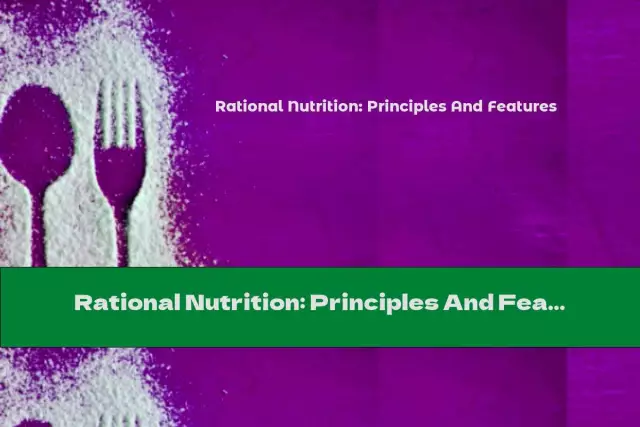- Author Rachel Wainwright wainwright@abchealthonline.com.
- Public 2023-12-15 07:39.
- Last modified 2025-11-02 20:14.
Balanced diet

Rational nutrition - a balanced diet based on gender, age, health status, lifestyle, nature of work and professional activity of a person, climatic conditions of his residence. A properly formulated diet increases the body's ability to resist negative environmental factors, helps maintain health, active longevity, resistance to fatigue and high performance. What are the basic principles of good nutrition? What is needed to organize a balanced diet?
Rational nutrition norms
Nutrition is the main source of energy for humans. With food, a person receives essential macro- and microelements, vitamins and acids that are not synthesized by the body. The body needs food to support vital processes, growth and development. The course of many processes in the human body depends on the nature and diet. Correct replenishment of proteins, fats, carbohydrates, vitamins helps to slow down the aging process, increases the body's resistance to non-infectious diseases and the ability to self-repair. The body also needs micronutrients, biologically active compounds that promote the production of enzymes that normalize metabolism.
No more than 10% of the population adheres to the norms of a balanced diet. Rational food recommendations are the average amount of nutrients a person needs. Compliance with the norms of a balanced diet helps to improve health, prevent diseases, conditions caused by an excess or lack of nutrients. The balance of nutrients in food contributes to the normal course of physiological and biochemical processes in the human body.
It is practically impossible to develop static norms in the conditions of a constantly changing rhythm of life and the environment. The latest norms of rational nutrition are set out in the Order of the Ministry of Health and Social Development of the Russian Federation No. 593 dated 2.08.2010. A rational human diet in accordance with these norms should include:
- Micronutrient-fortified baked goods and pasta;
- Vegetables, potatoes, melons;
- Meat, fish, fish products, poultry;
- Milk, dairy products (kefir, cottage cheese, butter, sour cream, cheese);
- Sugar;
- Eggs;
- Vegetable oils;
- Salt.
Not all of these foods are healthy. To get the maximum benefit and adhere to a balanced diet, you should give preference to products with a low fat content, exclude semi-finished products, as well as products subject to various types of thermal and chemical processing (smoked meats, canned food, sausages). Preference should be given to fresh products, avoiding long-term storage products.
This list also does not contain quantitative norms of products, since these parameters are determined by individual human factors.
Rational nutrition: principles and foundations
Rational nutrition is a special approach to the organization of nutrition and its regime, which is part of a healthy lifestyle. Rational nutrition contributes to the normalization of digestion processes, the absorption of nutrients, the natural secretion of waste products of the body, getting rid of extra pounds, and, therefore, adherence to the basics of a balanced diet contributes to the body's resistance to the development of diseases, the prerequisites for which are metabolic disorders, overweight, irregular nutrition, low quality products, energy imbalance.
The basic principles of good nutrition:
- Energy balance - the correspondence of the energy supplied with food to the amount of energy expended by the body in the process of life. The main source of energy for the body is the food consumed. The body spends energy to maintain body temperature, the functioning of internal organs, the course of metabolic processes, muscle activity. With an insufficient supply of energy from food, the body switches to internal sources of nutrition - fatty tissue, muscle tissue, which, with a prolonged energy deficit, will inevitably lead to depletion of the body. With a constant surplus of nutrients, the body stores fatty tissue as alternative food sources;
- The balance of nutrients that the body needs to function normally. According to the basics of rational nutrition, the optimal ratio of proteins, fats and carbohydrates is 1: 1: 4 for the adult population with low labor intensity and 1: 1: 5 with high labor intensity. The energy value of the diet of an adult living in a temperate climate and not involved in hard work should be distributed in the sequence of 13% protein foods, 33% fat-containing foods, and 54% carbohydrates;
- Compliance with the diet is one of the basic principles of good nutrition. The diet covers the time of the meal, its quantity, the intervals between meals. A balanced diet involves four meals a day, which contributes to sufficient saturation of the body and suppression of hunger, the absence of snacks between main meals, certain intervals between breakfast and lunch, lunch and dinner. This promotes the development of conditioned reflex reactions that prepare the body for food intake.
Correct organization of rational nutrition

For the correct organization of rational nutrition, it is necessary to take into account all the individual factors that also determine a person's capabilities (social status, financial situation, work schedule).
The correct organization of a balanced diet is one of the leading principles, among which the duration of a meal is distinguished, which should be approximately equal to 30 minutes, the correct distribution of the energy value of the diet during the day. A rational diet is based on the 25:50:25 principle, which determines the calorie content of the diet for breakfast, lunch and dinner. In the morning, you should give preference to slow carbohydrates and proteins, at lunch the body should get the maximum part of the nutrients, while dinner should consist of low-calorie foods.
Rational nutrition: menu and its variations
The principles of good nutrition involve the consumption of a balanced diet daily, depending on the needs of the body, taking into account individual factors. Subject to a balanced diet, the menu should include:
- Cereals;
- Whole wheat bread;
- Low-fat meats, eggs;
- Dairy products low in fat;
- Fresh fruits and vegetables.
Also, with a rational diet, the menu should exclude such types of thermal and chemical processing as roasting, smoking, preservation, since rational nutrition offers "healthy" alternatives to these products.
Found a mistake in the text? Select it and press Ctrl + Enter.






